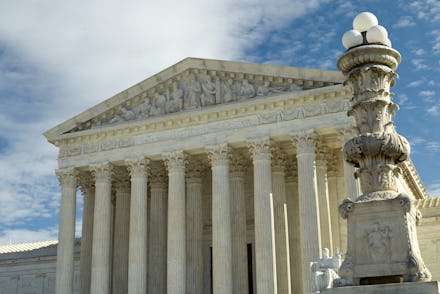The Supreme Court upheld a Trump rule making it harder for poorer people to get green cards

On Monday, the Supreme Court issued a 5-4 ruling that will allow the Trump administration unprecedented powers to restrict legal immigration. In August, the Department of Homeland Security announced that it would be creating a new expansive definition of the term “public charge,” as it applies to immigrants seeking a green card. The term, which refers to the idea that the DHS can deny a green card to anyone it deems likely to rely on public funds (becoming a so-called “charge” on the “public,” as it were), had been on the books for years. But it had generally been interpreted by prior governments to mean that it would only apply to those who would need cash benefits from the government. Trump’s DHS, though, expanded that definition to include non-cash benefits including food stamps, welfare, Medicaid, and housing assistance.
In addition, DHS would be allowed to use factors like age, health, and education to determine who would end up being a so-called “charge.” In other words, DHS could deny a green card to anyone it decided would be likely to end up poor, based on that person’s socioeconomic condition. Ken Cuccinelli, deputy homeland security secretary, announced that the rule change would support "the ideals of self-sufficiency and personal responsibility, ensuring that immigrants are able to support themselves and become successful here in America."
Immigration rights group disagreed. After DHS announced the policy change, New York, Connecticut, Vermont, and several immigrant advocacy groups filed a lawsuit opposing it. They argued that it would prevent immigrant families for signing up for desperately needed resources, to the detriment of their children’s health and safety. "This latest racially-motivated policy," said Marielena Hincapié, the executive director of the National Immigration Law Center, "will have a dire humanitarian impact, forcing some families to forego critical life-saving health care and nutrition."
A federal judge agreed, and issued an injunction against the rule, preventing the change from going into effect. Over the past six months, the law has made its way through the courts. Now that legal battle has come to an end, and the Supreme Court decided in Trump’s favor, in a 5-4 ruling along familiar partisan lines.
In a statement, Claudia Center, senior staff attorney with the ACLU’s Disability Rights Program, responded to the ruling. “This policy is yet another way for the Trump administration to hurt immigrants,” she said. “It enshrines the false stereotype that people with disabilities do not contribute to our society. Families will suffer. Congress has repeatedly declared that disability discrimination violates federal law. This rule must be stopped.”
In the wake of the high court’s decision, expect even more immigrant families to suffer at the hands of the same White House responsible for travesties like family separation and the travel ban. Driven by its white nationalist-adjacent immigration czar Stephen Miller, the administration has found yet another novel method to make life miserable for the neediest among us.